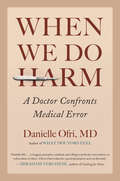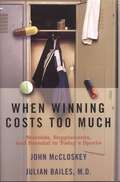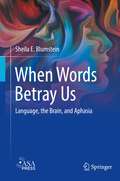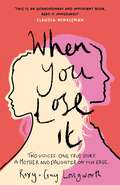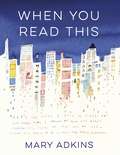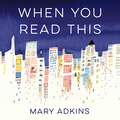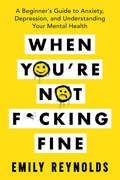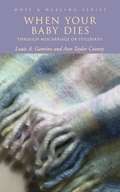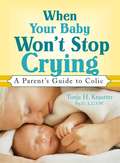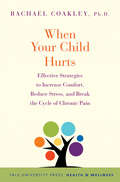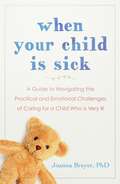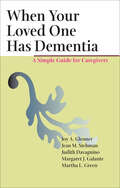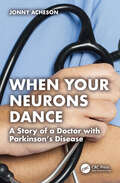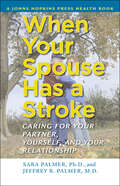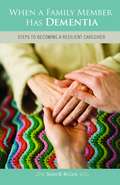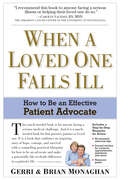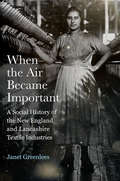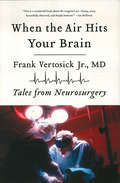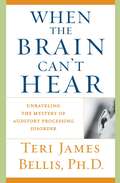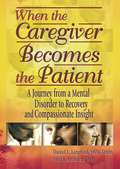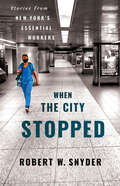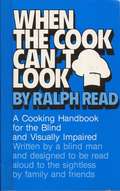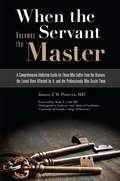- Table View
- List View
When We Do Harm: A Doctor Confronts Medical Error
by Danielle OfriMedical mistakes are more pervasive than we think. How can we improve outcomes? An acclaimed MD's rich stories and research explore patient safety.Patients enter the medical system with faith that they will receive the best care possible, so when things go wrong, it's a profound and painful breach. Medical science has made enormous strides in decreasing mortality and suffering, but there's no doubt that treatment can also cause harm, a significant portion of which is preventable. In When We Do Harm, practicing physician and acclaimed author Danielle Ofri places the issues of medical error and patient safety front and center in our national healthcare conversation. Drawing on current research, professional experience, and extensive interviews with nurses, physicians, administrators, researchers, patients, and families, Dr. Ofri explores the diagnostic, systemic, and cognitive causes of medical error. She advocates for strategic use of concrete safety interventions such as checklists and improvements to the electronic medical record, but focuses on the full-scale cultural and cognitive shifts required to make a meaningful dent in medical error. Woven throughout the book are the powerfully human stories that Dr. Ofri is renowned for. The errors she dissects range from the hardly noticeable missteps to the harrowing medical cataclysms.While our healthcare system is--and always will be--imperfect, Dr. Ofri argues that it is possible to minimize preventable harms, and that this should be the galvanizing issue of current medical discourse.
When Winning Costs Too Much: Steroids, Supplements, and Scandal in Today's Sports World
by Julian Bailes John McCloskeyThe authors combine to produce a work that addresses some of the most pressing issues in athletics today. While the book focuses primarily on steroid and supplement abuse, it also covers unethical practices on the part of some coaches and athletes to gain a competitive edge. Finally, it offers healthy alternatives to supplements for athletes wishing to gain size and strength without putting their future health at risk.
When Words Betray Us: Language, the Brain, and Aphasia
by Sheila E. BlumsteinThis book presents a journey into how language is put together for speaking and understanding and how it can come apart when there is injury to the brain. The goal is to provide a window into language and the brain through the lens of aphasia, a speech and language disorder resulting from brain injury in adults. This book answers the question of how the brain analyzes the pieces of language, its sounds, words, meaning, and ultimately puts them together into a unitary whole. While its major focus is on clinical, experimental, and theoretical approaches to language deficits in aphasia, it integrates this work with recent technological advances in neuroimaging to provide a state-of-the-art portrayal of language and brain function. It also shows how current computational models that share properties with those of neurons allow for a common framework to explain how the brain processes language and its parts and how it breaks down according to these principles. Consideration will also be given to whether language can recover after brain injury or when areas of the brain recruited for speaking, understanding, or reading are deprived of input, as seen with people who are deaf or blind. No prior knowledge of linguistics, psychology, computer science, or neuroscience is assumed. The informal style of this book makes it accessible to anyone with an interest in the complexity and beauty of language and who wants to understand how it is put together, how it comes apart, and how language maps on to the brain.
When You Lose It: Two voices. One true story. A mother and daughter on the edge. 'A very important subject' – ITV's This Morning
by Gay Longworth Roxy Longworth'Read this book. Then talk to your sons. It is essential reading' Jamie Theakston 'An extraordinary and important book. Read it immediately' Claudia Winkleman 'Superbly written, this deeply moving book underlines how truly precious mother-daughter relationships are, and never more so than in those teenage years' Gloria Hunniford A gripping memoir of two battling narratives and a mother-daughter relationship stretched to its absolute limits.Roxy was 13 years old when she was coerced then blackmailed into sending explicit photos, which were spread around her school. The shame led to self-loathing. The blame led to a psychotic breakdown. Roxy started hearing voices. Then she started seeing things...What happens when your teenager starts to lose it, and then you lose each other? What happens when you can't tell your mother you desperately need help? And how can a family move past a devastating mental health crisis?When You Lose It is a brutally honest true story, written from two perspectives, of consent, coercion and shattering consequences.
When You Lose It: Two voices. One true story. A mother and daughter on the edge. 'A very important subject' – ITV's This Morning
by Gay Longworth Roxy Longworth'Read this book. Then talk to your sons. It is essential reading' Jamie Theakston 'An extraordinary and important book. Read it immediately' Claudia Winkleman 'Superbly written, this deeply moving book underlines how truly precious mother-daughter relationships are, and never more so than in those teenage years' Gloria Hunniford A gripping memoir of two battling narratives and a mother-daughter relationship stretched to its absolute limits.Roxy was 13 years old when she was coerced then blackmailed into sending explicit photos, which were spread around her school. The shame led to self-loathing. The blame led to a psychotic breakdown. Roxy started hearing voices. Then she started seeing things...What happens when your teenager starts to lose it, and then you lose each other? What happens when you can't tell your mother you desperately need help? And how can a family move past a devastating mental health crisis?When You Lose It is a brutally honest true story, written from two perspectives, of consent, coercion and shattering consequences.
When You Read This: 'Deeply moving but also uplifting, Mary Adkins' debut novel is easy to read but hard to forget' - Anne Youngson
by Mary Adkins'Deeply moving but also uplifting' Anne Youngson, author of Meet Me at the MuseumFor four years, Iris Massey worked side by side with PR maven Smith Simonyi, helping clients perfect their brands. But Iris has died, taken by terminal illness at only thirty-three. Adrift without his friend and colleague, Smith is surprised to discover that in her last six months, Iris created a blog filled with sharp and often funny musings on the end of a life not quite fulfilled. She also made one final request: for Smith to get her posts published as a book. With the help of his charmingly eager, if overbearingly forthright, new intern Carl, Smith tackles the task of fulfilling Iris's last wish. Before he can do so, though, he must get the approval of Iris's big sister Jade, an haute cuisine chef who's been knocked sideways by her loss. Each carrying their own baggage, Smith and Jade end up on a collision course with their own unresolved pasts and with each other. Funny and moving in equal measures, When You Read This is a sparkling debut about love, life, and all the emails you really wish you'd never sent.Praise for When You Read This:'Thought-provoking, tear-jerking, funny - and [with] a delectable literary twist' Refinery29 'A touching, funny and life-affirming tale' Publishers Weekly'As with Maria Semple's Where'd You Go Bernadette, Adkins's debut novel is so much more than its clever style . . . [it] feels miraculous and leaves a lasting impression long after its final moment' Val Emmich, author of The Reminders'This gentle tragicomedy . . . deals sensitively with loss' Daily MailWhat reviewers have said about When You Read This:'A marvellous, funny, poignant and uplifting book . . . I hope you enjoy it as much as I did''I could not put it down . . . a very original and emotional read''What a delight this book is! . . . touched my heart and made me laugh''I read it in a single sitting, enjoying every minute of it''This book is a treasure. Every character is so full and unforgettable. Sad and funny and hopeful'
When You Read This: 'Deeply moving but also uplifting, Mary Adkins' debut novel is easy to read but hard to forget' - Anne Youngson
by Mary AdkinsWHEN YOU READ THIS is a warm, heart-breaker of a novel, and just as you think you might be on the verge of tears, it will tip you over into laughter instead.On his first day of work at a struggling brand management firm, an ambitious intern discovers a blog created by his predecessor, Iris Massey. Iris, he quickly learns, died a few months earlier, leaving a hole in the life of the firm's morose boss, Smith. Now, stuck at his desk all day, Carl-the-Intern - whose sky-high aspirations are thwarted only by Smith's sluggishness - gets hooked on Iris's blog, and the stories she tells about the life she left behind. Determined to share her story, Carl and Smith soon track down Iris' sister Jade, an haute cuisine chef who's been knocked sideways by her loss, finding solace only in potato chips and red wine. Smith and Jade, tied together by their mutual grief and each carrying their own baggage, end up on a collision course: with their own unresolved pasts, and also with each other. Funny and moving in equal measures, WHEN YOU READ THIS is a sparkling debut about love, life, and all the emails you really wish you'd never sent.(P)2019 Hodder & Stoughton Limited
When You're Not F*cking Fine: A Beginner's Guide to Anxiety, Depression, and Understanding Your Mental Health
by Emily ReynoldsA mental health guide to stand by you when everything is NOT okayHow do you stay healthy and realistic when you're also dealing with depression, mania, or anxiety? What do you do when, actually, you don't feel f*cking fine? In this blackly funny, deeply compassionate, and extremely practical book, Emily Reynolds gives personal account of what it's like to live with mental illness and the lessons that can help you start your own mental health journey.When You're Not F*cking Fine is a guide for people who know that self-care looks a lot different when you have to fight through your mental illness the whole way. This guide tackles the unique challenges of living with mental illness, anxiety, and depression, including how to:Get the help you need: find a diagnosis and the right treatment planDeal with pressure: manage stress even when you're already at your breaking pointMake time for self-care: kindness for when opening a window or taking out the trash feels impossibleGet on with your life: navigate the world of education, relationships, and expectations without sacrificing your progressWhen You're Not F*cking Fine will help you understand mental illness, deal with it, and make the journey feel a little less lonely.(Previously published as The Beginner's Guide to Losing Your Mind)
When Your Baby Dies Through Miscarriage or Stillbirth
by Louis A. Gamino Ann Taylor CooneyAdjusting to the loss of a baby through miscarriage or stillbirth
When Your Baby Won't Stop Crying: A Parent's Guide to Colic
by Tonja KrautterOne million babies born in the U.S. each year suffer from colic, and yet until now, colic has been only a footnote in baby care books. Defined as constant, unpredictable and inconsolable crying, parents dealing with colic are desperate for solutions. Now there's help. Mental health professional Tonja Krautter, having been through the ordeal of raising a baby with colic, offers parents a complete blueprint for coping, including:-- how to determine what may be causing your baby's colic-- successful strategies for soothing the baby, and what to do when you can't-- dealing with the emotional impact of colic on the rest of the family -- hope for getting to the other side of the colic experience
When Your Child Hurts
by Rachael CoakleyParents of a child in pain want nothing more than to offer immediate comfort. But a child with chronic or recurring pain requires much more. His or her parents need skills and strategies not only for increasing comfort but also for helping their child deal with an array of pain-related challenges, such as school disruption, sleep disturbance, and difficulties with peers. This essential guide, written by an expert in pediatric pain management, is the practical, accessible, and comprehensive resource that families and caregivers have been awaiting. It offers in-the-moment strategies for managing a child's pain along with expert advice for fostering long-term comfort. Dr. Rachael Coakley, a clinical pediatric psychologist who works exclusively with families of children with chronic or recurrent pain, provides a set of research-proven strategies-some surprisingly counter-intuitive-to achieve positive results quickly and lastingly. Whether the pain is disease-related, the result of an injury or surgery, or caused by another condition or syndrome, this book offers what every parent of a child in pain most needs: effective methods for reversing the cycle of chronic pain. "
When Your Child Is Sick: A Guide to Navigating the Practical and Emotional Challenges of Caring for a Child Who is Very Ill
by Joanna Breyer'Warm, wise and practical' Cressida Cowell, MBEAn invaluable reference for parents of sick or hospitalised children by an experienced and eminent psychologist. To many parents, it is hard to imagine a more upsetting reality than one where their child is hospitalised, severely sick, or terminally ill. In When Your Child is Sick, psychologist Joanna Breyer distils decades of experience working with sick children and their families into a comprehensive guide for navigating the uncharted and frightening terrain. She provides expert advice to guide them through the hospital setting, at-home care, and long-term outcomes.Breyer's actionable techniques and direct advice will help parents feel more in-control of a circumstance that has upended their life. She alerts parents to key personnel in the hospital, gives dialogue prompts to help parents ask for the help they need, addresses the needs of their other children at home, offers advice on how to best utilise friends and family who want to help, includes stories from other families who have been there, and teaches coping techniques to help both parents and children weather the stress of prolonged illness and even death.When Your Child is Sick is a valuable guide to managing the myriad practical and emotional complications of an impossible situation.
When Your Loved One Has Dementia: A Simple Guide for Caregivers
by Joy A. Glenner Jean M. Stehman Judith Davagnino Margaret J. Galante Martha L. GreenEighty percent of persons with dementia live at home, and the family members caring for them are often overwhelmed by the enormous responsibility and the complexities of care. This book is designed to support the caregivers and help them understand the needs and feelings of the person for whom they are caring. A central focus is the goal of sustaining a loving family relationship between the caregiver and the patient. Developed from a training program for professionals and family caregivers, this book teaches the basics of dementia care while emphasizing communication, understanding and acceptance, and personal growth through the caregiving experience. The result is a guide that integrates the practicalities of caregiving with the human emotions that accompany it.
When Your Neurons Dance: A Story of a Doctor with Parkinson’s
by Jonny AchesonAs an Emergency Medicine consultant in one of the busiest departments in the UK, Dr Jonny Acheson loved his job. Fuelled by adrenaline, he treated and cared for some of the sickest patients who came through the doors.In 2016, when he was 41, he was diagnosed with Parkinson’s, a progressive neurological condition for which there is no cure.He found it increasingly difficult to multitask in his fast-paced world. The environment that he thrived in made his symptoms worse. Parkinson’s challenged his professional identity as an emergency doctor, and he didn’t know what to do.When Your Neurons Dance is about how he is adapting over time with support around him - how he looked to the past to help him in the present, embracing change as new doors opened both inside and outside medicine.Ultimately as a doctor practising with Parkinson’s, he found a way to give back, despite a condition that always takes away.
When Your Spouse Has a Stroke: Caring for Your Partner, Yourself, and Your Relationship (A Johns Hopkins Press Health Book)
by Sara Palmer Jeffrey B. PalmerA stroke can alter two people's lives in an instant. For the person who has had a stroke, simple tasks suddenly become difficult or impossible. For that person's partner, life seems to revolve mostly around the stroke survivor's needs. Such a drastic change naturally requires making many, sometimes taxing, adjustments. In this book, two experts in stroke recovery help couples deal with the impact of stroke on their lives and their relationship. Drs. Sara and Jeffrey Palmer explain how to overcome three major challenges:• providing quality care for your partner• maintaining or rebuilding your relationship• caring for yourself as an individualThe book invites you into the lives of real couples who are themselves coping with these challenges. Their experiences model how you can improve essential aspects of your relationship, including communication, roles and responsibilities, and sexuality. A list of practical tips summarizes each chapter, providing a handy reference guide to meeting each day's challenges.More than just a discussion of the medical and practical aspects of stroke and stroke recovery, this book focuses on the emotional, psychological, and social consequences of stroke and the deeply personal side of caregiving. When Your Spouse Has a Stroke will relieve your burden and strengthen your partnership.
When a Family Member Has Dementia: Steps to Becoming a Resilient Caregiver
by Susan MccurryThe following quote is taken from the "Introduction" of the book which was written by Dr. Linda Teri: "Dr. McCurry brings to the caregiving community this book of hope. By presenting glimpses of the caregivers she has worked with over her years of clinical work, she shows the rich diversity of possibilities. She illustrates how things can improve, as well as how to cope with those times when it feels like things can only get worse. For caregivers just embarking on this mission, Dr. McCurry's compassion shines through. She will help you understand the disease process as well as how to deal with it. For experienced caregivers, whether family or friend, Dr. McCurry's insights may bring new ideas to old problems." Dr. McCurry offers many exercises designed to help people cope with the person who has dementia. The exercises and her suggestions are based on her knowledge of psychology and on her psychotherapeutic background.
When a Loved One Falls Ill: How to Be an Effective Patient Advocate
by Brian Monaghan Gerri MonaghanThe much-needed book for anyone with a loved one facing a serious illness. It is the book that’s a bible for how to make the potentially life-or-death decisions that every medical advocate, and every patient, must grapple with—especially now, as health care becomes ever more complicated. It is the practical blueprint for how to be a successful medical advocate. When Gerri Monaghan’s husband, Brian, then a fifty-nine-year-old lawyer at the top of his game, got the news that all of us dread—a diagnosis of brain tumors caused by Stage IV melanoma with a prognosis of three to six months to live—she knew that this was a challenge the two of them would fight together. Brian brought his enormous courage, attitude, and reserves of humor, and Gerri, with dogged determination, stood up again and again for what they needed—tirelessly researching options, reaching out to friends, family, and anyone who could help, resisting the status quo, and always thinking in terms of “we.”Together they tell their story, back and forth, punctuated throughout by Gerri’s top 50 tips for how to be an advocate: #1 Trust your intuition. #6 Create a battle plan. #15 Get copies of records. #26 Make doctors speak in a language that you understand. #33 Don’t schedule surgery during the holidays. #49 Remember, this is not a dress rehearsal.
When the Air Became Important: A Social History of the New England and Lancashire Textile Industries (Critical Issues in Health and Medicine)
by Janet GreenleesIn When the Air Became Important, medical historian Janet Greenlees examines the working environments of the heartlands of the British and American cotton textile industries from the nineteenth to the late twentieth centuries. Greenlees contends that the air quality within these pioneering workplaces was a key contributor to the health of the wider communities of which they were a part. Such enclosed environments, where large numbers of people labored in close quarters, were ideal settings for the rapid spread of diseases including tuberculosis, bronchitis and pneumonia. When workers left the factories for home, these diseases were transmitted throughout the local population, yet operatives also brought diseases into the factory. Other aerial hazards common to both the community and workplace included poor ventilation and noise. Emphasizing the importance of the peculiarities of place as well as employers’ balance of workers’ health against manufacturing needs, Greenlees’s pioneering book sheds light on the roots of contemporary environmentalism and occupational health reform. Her work highlights the complicated relationships among local business, local and national politics of health, and community priorities.
When the Air Hits Your Brain: Tales From Neurosurgery
by Frank Vertosick Jr.The story of one man's evolution from naive and ambitious young intern to world-class neurosurgeon. With poignant insight and humor, Frank Vertosick Jr., MD, describes some of the greatest challenges of his career, including a six-week-old infant with a tumor in her brain, a young man struck down in his prime by paraplegia, and a minister with a .22-caliber bullet lodged in his skull. Told through intimate portraits of Vertosick’s patients and unsparing yet fascinatingly detailed descriptions of surgical procedures, When the Air Hits Your Brain—the culmination of decades spent struggling to learn an unforgiving craft—illuminates both the mysteries of the mind and the realities of the operating room.
When the Brain Can't Hear
by Teri James BellisMillions of Americans have difficulty understanding spoken language. They're not deaf, autistic, or slow. They have APD. APD has been called the auditory equivalent of dyslexia, and its debilitatiting effects cross all ages, genders, and races. APD can cause children to fail in school and adults to suffer socially and in their careers, but until now, there has been little information available. Written by Dr. Teri James Bellis, one of the world's foremost authorities on APD, this is the first book on the subject that is completely accessible to the public. Through helpful checklists and case studies, you'll finally discover the answers you need, as well as proven strategies for living with APD. Comprehensive and powerfully prescriptive, this book contains vital information for anyone who suffers from this serious disorder. When the Brain Can't Hear gives you all the latest information: What is APD? how APD affects children APD in adults diagnosis and testing treatment options living successfully with APD memory enhancement and other coping techniques
When the Brain Can't Hear: Unraveling the Mystery of Auditory Processing Disorder
by Teri James BellisThe author, diagnosed with auditory processing disorder in adulthood, provides an explanation of the disorder and how to live with it.
When the Caregiver Becomes the Patient: A Journey from a Mental Disorder to Recovery and Compassionate Insight
by Harold G Koenig Emil J Authelet Daniel L LangfordExamine a compelling account of a professional caregiver’s inspirational struggle with a mind/body illness and the renewed sense of compassion his recovery provides.This uplifting narrative is the story of a caregiving professional stricken by panic attacks, a wounded healer desperate to be healed. When the Caregiver Becomes the Patient is the candid and compassionate first-hand account of Daniel Langford’s struggle with the anxiety disorder that signals a physical, cognitive, and emotional crisis that paralyzes him, despite his extensive background as a health care professional, social worker, and pastoral minister. His journey from the disorder’s horrifying onset to the understanding and acceptance of its roots, and finally, to an insight that evokes a renewed appreciation for the human spirit is an inspirational guide to healing and recovery.The anecdotal form of When the Caregiver Becomes the Patient lends itself to a personal retelling of Langford’s struggle, detailing his sessions with family physician Dr. David Betat, and colleague and co-author Dr. Emil Authelet as they explore the biopsychosocial and spiritual dimension of Langford’s attacks. Their informal dialogues serve as a model of how a lateral relationship between colleagues can create an environment for healing and recovery that can be passed on to others. The book also critiques and reviews existing literature on panic attacks and anxiety disorders related to the author’s search for understanding.When the Caregiver Becomes the Patient examines: panic attacks--cause, treatment, and recovery a critique of existing literature on panic attacks clinical and spiritual perspectives on anxiety disorders critical elements of the healing process effects on the caregiver’s relationship with his/her client a fresh model for the caregiver/patient relationshipAn essential resource for caregivers, counselors and therapists, educators, physicians, and health care and religious professionals, as well as those searching for an understanding of anxiety disorders, When the Caregiver Becomes the Patient reassures those who receive care that the care giver struggles with life as well. That understanding of the mutuality of pain and recovery creates a connection that helps ease the isolation that often accompanies suffering.
When the City Stopped: Stories from New York's Essential Workers
by Robert W. SnyderIn When the City Stopped, Robert Snyder tells the story of COVID-19 in the words of ordinary New Yorkers, illuminating the fear and uncertainty of life in the early weeks and months, as well as the solidarity that sustained the city. New Yorkers were "alone together," separated by the protective measures of social distancing and the fundamental inequalities of life and work in New York City. Through their personal accounts, we see that while many worked from home, others knowingly exposed themselves to the dangers of the pandemic as they drove buses, ran subways, answered 911 calls, tended to the sick, and made and delivered meals. Snyder builds bridges of knowledge and empathy between those who bore dangerous burdens and those who lived in relative safety. The story is told through the words of health care workers, grocery clerks, transit workers, and community activists who recount their experiences in poems, first-person narratives, and interviews. When the City Stopped preserves for future generations what it was like to be in New York when it was at the center of the pandemic.
When the Cook Can't Look: A Cooking Handbook for the Blind and Visually Impaired
by Ralph Read<P>This cooking handbook, designed to be read to the blind and visually impaired by a relative or friend, is written by one who is most qualified-- a blind person. <P>Ralph Read lost his sight in adulthood and now, from personal experience, makes available to other sightless individuals his innovative, sensible and safe methods for coping in the kitchen.
When the Servant Becomes the Master
by Mark S. Gold Jason Z.W. PowersThe definitive guide to addiction that addresses misinformation and stigma, humanizes the disease within a framework of science, research, and personal experience, and provides a wealth of information on the various forms addiction takes as well as rich data regarding treatments.
